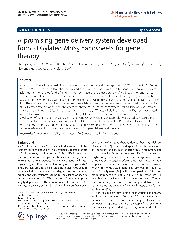摘要
A new class of two-dimensional (2D) nanomaterial, transition metal dichalcogenides (TMDCs) such as MoS2, MoSe2, WS2, and WSe2 which have fantastic physical and chemical properties, has drawn tremendous attention in different fields recently. Herein, we for the first time take advantage of the great potential of MoS2 with well-engineered surface as a novel type of 2D nanocarriers for gene delivery and therapy of cancer. In our system, positively charged MoS2-PEG-PEI is synthesized with lipoic acid-modified polyethylene glycol (LA-PEG) and branched polyethylenimine (PEI). The amino end of positively charged nanomaterials can bind to the negatively charged small interfering RNA (siRNA). After detection of physical and chemical characteristics of the nanomaterial, cell toxicity was evaluated by 3-(4,5-dimethylthiazol-2-yl)-2,5-diphenyltetrazolium bromide (MTT) assay. Polo-like kinase 1 (PLK1) was investigated as a well-known oncogene, which was a critical regulator of cell cycle transmission at multiple levels. Through knockdown of PLK1 with siRNA carried by novel nanovector, qPCR and Western blot were used to measure the interfering efficiency; apoptosis assay was used to detect the transfection effect of PLK1. All results showed that the novel nanocarrier revealed good biocompatibility, reduced cytotoxicity, as well as high gene-carrying ability without serum interference, thus would have great potential for gene delivery and therapy.
- 出版日期2014-10-27
- 单位苏州大学
